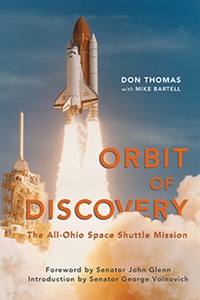Review: Orbit of Discoveryby Jeff Foust
|
| What makes Orbit of Discovery so interesting, perhaps, is that the mission was relatively routine. It offers a look at a time when the Space Shuttle program was hitting its stride. |
But what about STS-70? As shuttle missions go, it was about as close to routine as they come: Discovery spent nearly nine days in space on this mid-1995 mission, deployed a TDRS communications satellite, and performed some research. There were no visits to space stations, no high-wire repairs in space, no major malfunctions for the crew to overcome. It doesn’t sound like much for a book, let alone one running nearly 400 pages.
Yet, in Orbit of Discovery, one of the members of the STS-70 crew, Don Thomas, provides—at least for space aficionados—a fascinating look at that mission. The hook for his account, written with journalist Mike Bartell, is the missions’s crew, which declared themselves an “all-Ohio” crew. That was a bit of a stretch, as only four of the five astronauts on the crew, including Thomas, hailed from the Buckeye State. The fifth, pilot Kevin Kregel, was from New York, but Thomas and the others got then-Ohio Gov. George Voinovich to declare him an “honorary” Ohioan. (Voinovich, who attended the launch and welcomed the crew to Ohio after the mission, wrote the book’s introduction, while another famous Ohioan, John Glenn, wrote the foreword.)
That all-Ohio flavor to the crew—if slightly contrived—provided some positive attention to a mission that was otherwise fairly routine, and overshadowed by the previous mission, STS-71, which featured the first docking of a shuttle to Russia’s Mir space station. The only other major attention that the mission got was more infamous: its launch was delayed by a month when a woodpecker drilled hundreds of holes into the foam insulation of the shuttle’s external tank while sitting on the pad, forcing it to be rolled back for repairs. The woodpecker ended up becoming the unofficial mascot of the mission, in a sense, particularly after the mission’s primary objective, deployment of the TDRS-G satellite, took place successfully on the mission’s first day, allowing the crew and flight controllers to relax a bit.
Orbit of Discovery is also a memoir for Thomas, starting with watching the launch of Alan Shepard on television while in kindergarten, an event that triggered his interest in becoming an astronaut. He traces his long path to becoming an astronaut, a journey both similar to those recounted by others but also with his unique flavor, including multiple rejections by NASA before finally being selected in 1990. STS-70 was his second shuttle flight, after STS-65; afterwards, he flew on the truncated STS-83 Spacelab mission and its quick reflight, STS-94.
What makes Orbit of Discovery so interesting, perhaps, is that the mission was relatively routine. It offers a look at a time when the Space Shuttle program was hitting its stride, flying six to eight missions a year to perform research and deploy satellites, and before it became the primary means to construct the International Space Station. Thomas traces the arc of that mission from training to flight to the post-mission debriefings and public appearances. It’s a look back at a time not so long ago—less than 20 years—that’s yet a very different era in human spaceflight.
